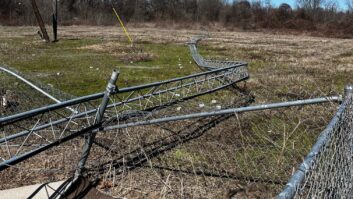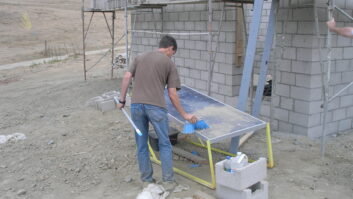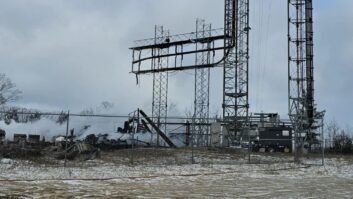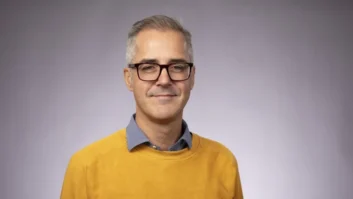
Fig. 1: Even a short coil of coax can tempt a thief. Former DOE for the Mega stations Bill Sullivan experienced three transmission line attacks in four months last year, the last ending in an arrest.
The first resulted in the disappearance of the coil at the base of the tower seen in Fig. 1. (The photo was taken prior to the theft.) This line was excess after Bill moved an old main FM antenna down the tower to make room for a new one.
Since this was now an aux line it wasn’t active at the time of theft, but Bill had a pressure alarm on the line, which alerted him after the fact.
Fig. 2 shows stub of the line, which Bill taped up.
A month or two later, someone harvested the next 40 feet of that same line. On their way out, they also took about 6 feet of rigid line that was used to connect the active flex line to the transmitter inside the building. This took the station off the air for almost 10 hours while a new section was fabricated by Central Florida Tower, delivered and installed.

Fig. 2: All that was left was the end of the cut line. Had the thief not gotten greedy the second theft would not have been discovered immediately.
A few weeks later Bill was alerted to yet another incident by an off-air alarm that tripped while the thief was cutting the active line. Bill switched on his radio, heard nothing and turned the transmitter back on, only to hear the station for a moment, then nothing again.
“I don’t know if he felt anything while he was cutting, but I hope he did,” Bill says of the thief.
That outage lasted 29 hours. Again, Central Florida Tower was able to fabricate and install a replacement line.
Meanwhile, Bill contacted police. A sheriff’s deputy stopped a man leaving the area and noticed a red mark on his arm, apparently from oxidized paint on the tank visible in Fig. 3. (The officer later simulated cutting the line and his own arm brushed the tank, making a similar transfer mark.)
The police also found black PVC dust on a Sawzall blade in the guy’s truck.
The thief told authorities he knew who stole the earlier line sections and figured he’d try it himself. Whether it was him all along is anyone’s guess. Fig. 3 shows the scene after the third try in April; note the cut line near the diesel tank.

Fig. 3: After yet another attempt. This last attempt also involved copper grounding strap as well as the power ground.
Lessons learned here: If you don’t have off-air and pressure alarms tied to your remote control, you’re taking a chance. With people looking to turn a quick buck selling surplus copper, your transmitter sites are prime targets.
In the July 1 Workbench, we also mentioned that vandalism and damage to a broadcast facility can elevate the crime to a federal level; but I guess that depends where you live.
Bill reported these thefts to the Federal Communications Commission and the Federal Bureau of Investigation. He says the commission office in Tampa had absolutely no interest because the individual — who’d been caught and subsequently pled no contest — had not caused unauthorized transmissions. (Of course, he did silence an authorized one.)
Bill says the FBI person he reached really wasn’t interested either, and when Bill mentioned homeland security he became angry and asked if Bill was trying to cause trouble. At that point, Bill let local law enforcement handle the incidents. Unbelievably, the sentence was probation and restitution for the line section and labor to replace it.
Bill Sullivan is doing contract work in Tampa and has also joined viaRadio to help in getting the HEARO alert system deployed in Florida.
* * *
Philip Vaughan is a chief engineer for a group of stations in Colton, Calif. With an eye toward renewing his SBE certification — Workbench submissions qualify for recertification credit — Philip writes about something that has helped him considerably. The subject? Internships.
Especially with today’s economy and everyone pulling back their spending, engineers are finding themselves doing more with less. In Philip’s mind, internships are a hugely untapped resource in the engineering community.
Many engineers think that interns don’t have a place in broadcast engineering because of the specific knowledge and education one needs to do this job, but there are things that an intern can do with minimal knowledge and leave you with the time for the “heavy lifting.”
Philip has used interns for years. One of the first things he teaches an intern is how to solder. This opens up a world of possibilities. By learning proper soldering technique they can make cables and even de-solder or solder components on equipment you may be working on. These tools are useful especially if you are in the middle of a new or existing wiring project.
The next thing to teach them is your wiring infrastructure. If you can teach them the layout and make up a single-line drawing, they can put in wiring for you. The trick here is to give details in the explanation and check up on their progress often. Either way, it will save you a ton of time.
If you think about it, there are many tasks in the engineering and IT shops that could be done by an intern with minimal training.
When looking for an intern, you don’t want to grab just anyone. Philip tends to look for people taking college courses in IT or electronics. Job fairs are a great place to meet some of these candidates, but a call to the local high school or community college/university works just as well.
Not only is this a great opportunity to recruit some free help, but it is also a great way to solicit new people into our industry.
In 2007 the NAB Education Foundation launched an internship program geared toward aspiring professionals in broadcast technology and engineering fields, but it appears to be dormant. Under the program, several college seniors and recent graduates were selected to participate in an eight-week paid internship program at radio and television stations. (If you think it’s important, let them know! We’ll tell you more if we hear more.)
Do you know of an internship or similar program that can be used to benefit the engineering profession? Share it here.
John Bisset has worked as a chief engineer and contract engineer for 39 years. He is international sales manager for Europe and Southern Africa for Nautel and a past recipient of the SBE’s Educator of the Year Award. Reach him at[email protected]. Faxed submissions can be sent to (603) 472-4944.
Submissions for this column are encouraged and qualify for SBE recertification credit.












